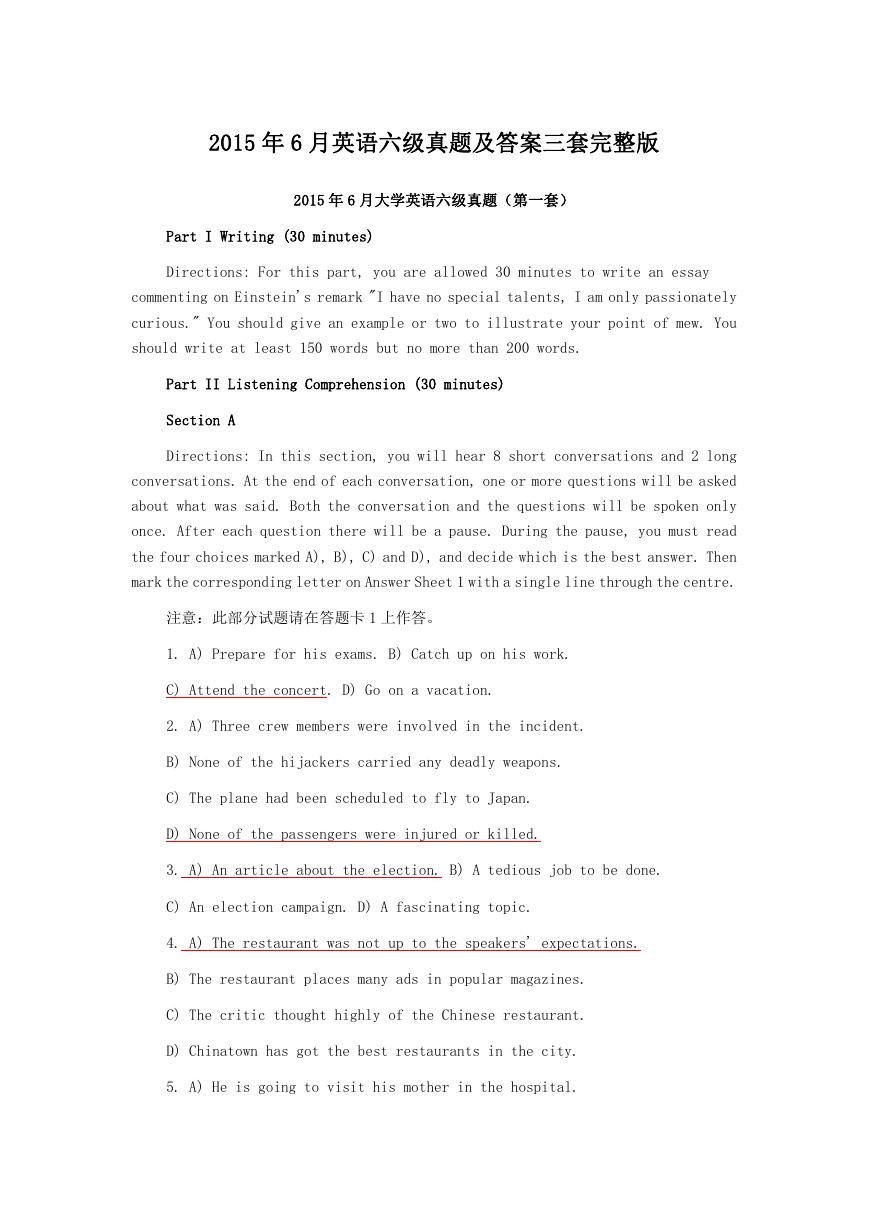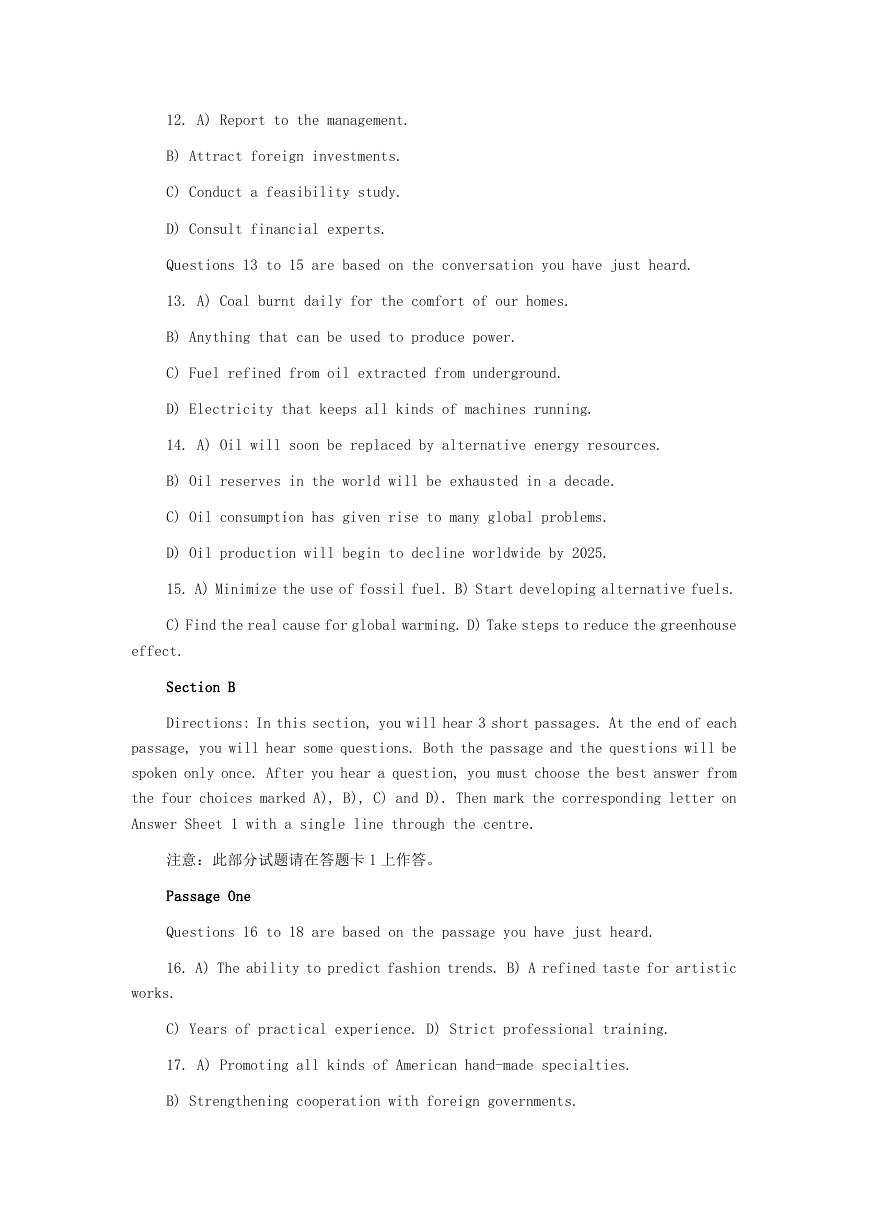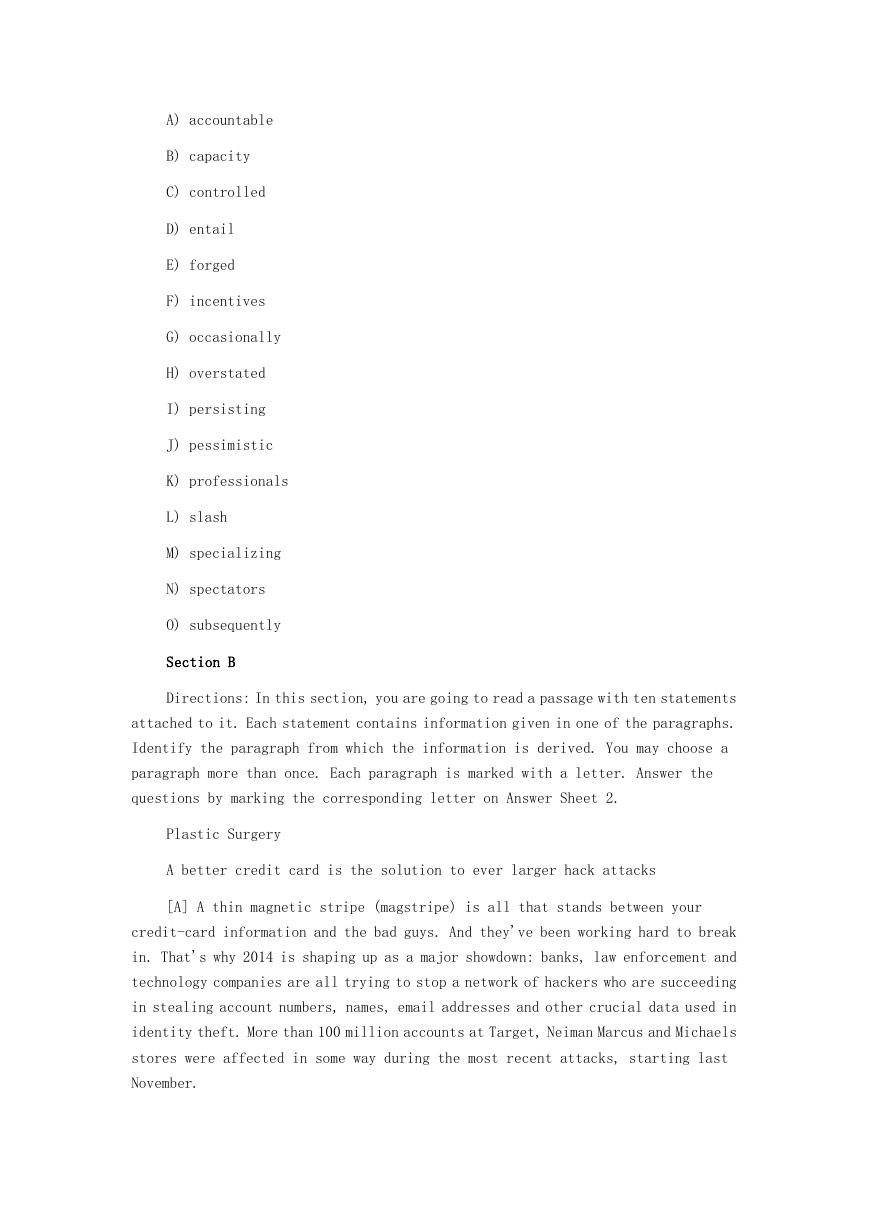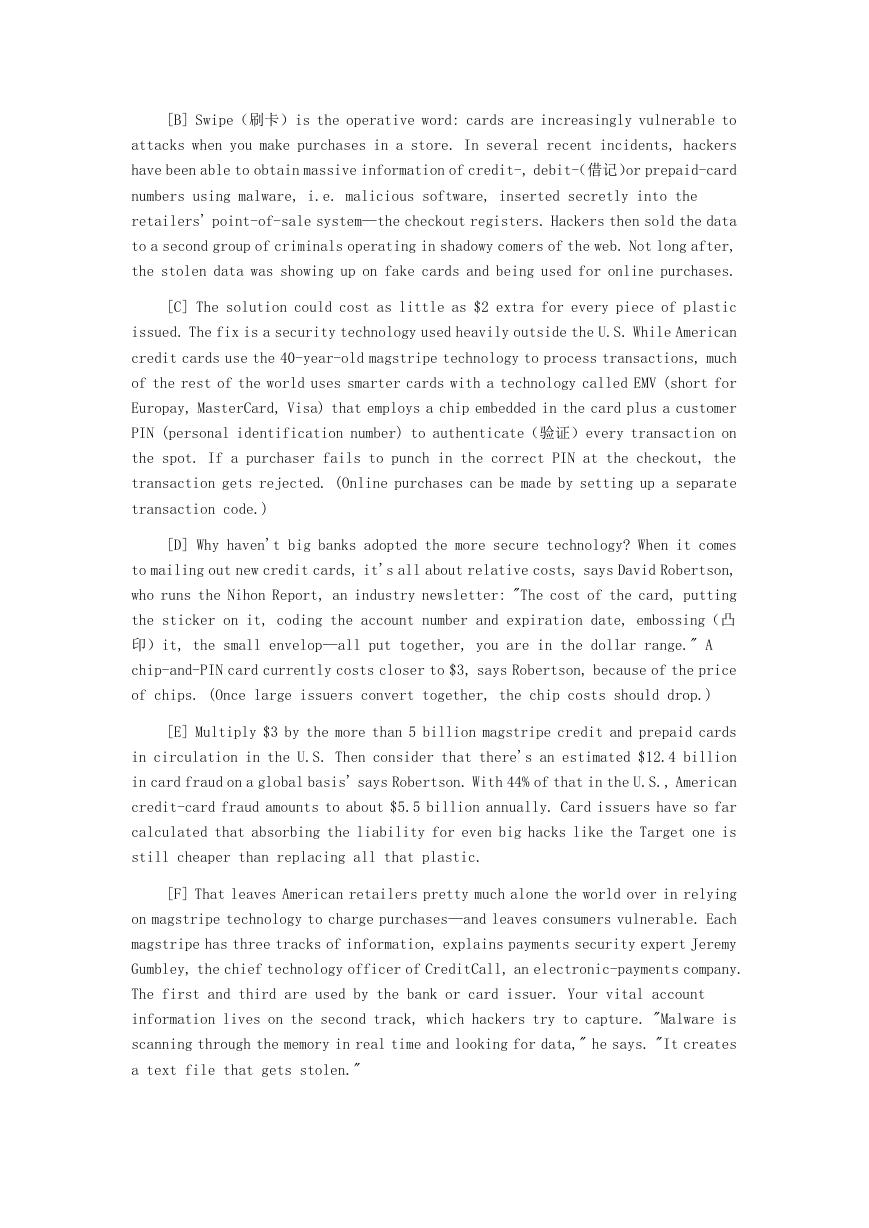2015 年 6 月英语六级真题及答案三套完整版
2015 年 6 月大学英语六级真题(第一套)
Part I Writing (30 minutes)
Directions: For this part, you are allowed 30 minutes to write an essay
commenting on Einstein's remark "I have no special talents, I am only passionately
curious." You should give an example or two to illustrate your point of mew. You
should write at least 150 words but no more than 200 words.
Part II Listening Comprehension (30 minutes)
Section A
Directions: In this section, you will hear 8 short conversations and 2 long
conversations. At the end of each conversation, one or more questions will be asked
about what was said. Both the conversation and the questions will be spoken only
once. After each question there will be a pause. During the pause, you must read
the four choices marked A), B), C) and D), and decide which is the best answer. Then
mark the corresponding letter on Answer Sheet 1 with a single line through the centre.
注意:此部分试题请在答题卡 1 上作答。
1. A) Prepare for his exams. B) Catch up on his work.
C) Attend the concert. D) Go on a vacation.
2. A) Three crew members were involved in the incident.
B) None of the hijackers carried any deadly weapons.
C) The plane had been scheduled to fly to Japan.
D) None of the passengers were injured or killed.
3. A) An article about the election. B) A tedious job to be done.
C) An election campaign. D) A fascinating topic.
4. A) The restaurant was not up to the speakers' expectations.
B) The restaurant places many ads in popular magazines.
C) The critic thought highly of the Chinese restaurant.
D) Chinatown has got the best restaurants in the city.
5. A) He is going to visit his mother in the hospital.
�
B) He is going to take on a new job next week.
C) He has many things to deal with right now.
D) He behaves in a way nobody understands.
6. A) A large number of students refused to vote last night.
B) At least twenty students are needed to vote on an issue.
C) Major campus issues had to be discussed at the meeting.
D) More students have to appear to make their voice heard.
7. A) The woman can hardly tell what she likes.
B) The speakers like watching TV very much.
C) The speakers have nothing to do but watch TV.
D) The man seldom watched TV before retirement.
8. A) The woman should have retired earlier.
B) He will help the woman solve the problem.
C) He finds it hard to agree with what the woman says.
D) The woman will be able to attend the classes she wants.
Questions 9 to 12 are based on the conversation you have just heard.
9. A) Persuade the man to join her company.
B) Employ the most up-to-date technology.
C) Export bikes to foreign markets.
D) Expand their domestic business.
10. A) The state subsidizes small and medium enterprises.
B) The government has control over bicycle imports.
C) They can compete with the best domestic manufactures.
D) They have a cost advantage and can charge higher prices.
11. A) Extra costs might eat up their profits abroad.
B) More workers will be needed to do packaging.
C) They might lose to foreign bike manufacturers.
D) It is very difficult to find suitable local agents.
�
12. A) Report to the management.
B) Attract foreign investments.
C) Conduct a feasibility study.
D) Consult financial experts.
Questions 13 to 15 are based on the conversation you have just heard.
13. A) Coal burnt daily for the comfort of our homes.
B) Anything that can be used to produce power.
C) Fuel refined from oil extracted from underground.
D) Electricity that keeps all kinds of machines running.
14. A) Oil will soon be replaced by alternative energy resources.
B) Oil reserves in the world will be exhausted in a decade.
C) Oil consumption has given rise to many global problems.
D) Oil production will begin to decline worldwide by 2025.
15. A) Minimize the use of fossil fuel. B) Start developing alternative fuels.
C) Find the real cause for global warming. D) Take steps to reduce the greenhouse
effect.
Section B
Directions: In this section, you will hear 3 short passages. At the end of each
passage, you will hear some questions. Both the passage and the questions will be
spoken only once. After you hear a question, you must choose the best answer from
the four choices marked A), B), C) and D). Then mark the corresponding letter on
Answer Sheet 1 with a single line through the centre.
注意:此部分试题请在答题卡 1 上作答。
Passage One
Questions 16 to 18 are based on the passage you have just heard.
16. A) The ability to predict fashion trends. B) A refined taste for artistic
works.
C) Years of practical experience. D) Strict professional training.
17. A) Promoting all kinds of American hand-made specialties.
B) Strengthening cooperation with foreign governments.
�
C) Conducting trade in art works with dealers overseas.
D) Purchasing handicrafts from all over the world.
18. A) She has access to fashionable things. B) She is doing what she enjoys
doing.
C) She can enjoy life on a modest salary. D) She is free to do whatever she
wants.
Passage Two
Questions 19 to 22 are based on the passage you have just heard.
19. A) Join in neighborhood patrols.
B) Get involved in his community.
C) Voice his complaints to the city council.
D) Make suggestions to the local authorities.
20. A) Deterioration in the quality of life.
B) Increase of police patrols at night.
C) Renovation of the vacant buildings.
D) Violation of community regulations.
21. A) They may take a long time to solve.
B) They need assistance from the city.
C) They have to be dealt with one by one.
D) They are too big for individual efforts.
22. A) He had got some groceries at a big discount.
B) He had read a funny poster near his seat.
C) He had done a small deed of kindness.
D) He had caught the bus just in time.
Passage Three
Questions 23 to 25 are based on the passage you have just heard.
23. A) Childhood and family growth. B) Pressure and disease.
C) Family life and health. D) Stress and depression.
24. A) It experienced a series of misfortunes.
�
B) It was in the process of reorganization.
C) His mother died of a sudden heart attack.
D) His wife left him because of his bad temper.
25. A) They would give him a triple bypass surgery.
B) They could remove the block in his artery.
C) They could do nothing to help him.
D) They would try hard to save his life.
Section C
Directions: In this section, you will hear a passage three times. When the
passage is read for the first time, you should listen carefully for its general idea.
When the passage is read for the second time, you are required to fill in the blanks
with the exact words you have just heard. Finally, when the passage is read for the
third time, you should check what you have written.
注意:此部分试题请在答题卡 1 上作答。
When most people think of the word "education", they think of a pupil as a sort
of animate sausage casing. Into this empty casting, the teachers (26)____ stuff
"education".
But genuine education, as Socrates knew more than two thousand years ago, is
not (27) ____ the stuffing of information into a person, but rather eliciting
knowledge from him; it is the (28) ____ of what is in the mind.
"The most important part of education'" once wrote William Ernest Hocking, the
(29) ____ Harvard philosopher, "is this instruction of a man in what he has inside
of him."
And, as Edith Hamilton has reminded us, Socrates never said, "I know, learn
from me" He said, rather, "Look into your own selves and find the (30) ____ of truth
that God has put into every heart, and that only you can kindle(点淋)to a (31)
____."
In a dialogue, Socrates takes an ignorant slave boy, without a day of (32) ____,
and proves to the amazed observers that the boy really "knows" geometry—because
the principles of geometry are already in his mind, waiting to be called out.
So many of the discussions and (33) ____ about the content of education are
useless and inconclusive because they (34) ____ what should "go into" the student
rather than with what should be taken out, and how this can best be done.
�
The college student who once said to me, after a lecture, "I spend so much time
studying that I don't have a chance to learn anything," was clearly expressing his
(35) ____ with the sausage casing view of education.
Part III Reading Comprehension (40 minutes)
Section A
Directions: In this section, there is a passage with ten blanks. You are required
to select one word for each blank from a list of choices given in a word bank following
the passage. Read the passage through carefully before making your choices. Each
choice in the bank is identified by a letter. Please mark the corresponding letter
for each item on Answer Sheet 2 with a single line through the centre. You may not
use any of the words in the bank more than once.
Questions 36 to 45 are based on the following passage.
Travel websites have been around since the 1990s, when Expedia, Travelocity,
and other holiday booking sites were launched, allowing travelers to compare flight
and hotel prices with the click of a mouse. With information no longer 36____ by
travel agents or hidden in business networks, the travel industry was revolutionized,
as greater transparency helped 37____ prices.
Today, the industry is going through a new revolution—this time transforming
service quality. Online rating platforms—38____ in hotels, restaurants, apartments,
and taxis—allow travelers to exchange reviews and experiences for all to see.
Hospitality businesses are now ranked, analyzed, and compared not by industry
39____, but by the very people for whom the service is intended—the customer. This
has 40____ a new relationship between buyer and seller. Customers have always voted
with their feet; they can now explain their decision to anyone who is interested.
As a result, businesses are much more 41____, often in very specific ways, which
creates powerful 42____ to improve service.
Although some readers might not care for gossipy reports of unfriendly bellboys
(行李员)in Berlin or malf-unctioning hotel hairdryers in Houston, the true power
of online reviews lies not just in the individual stories, but in the websites' 43____
to aggregate a large volume of ratings.
The impact cannot be 44____. Businesses that attract top ratings can enjoy rapid
growth, as new customers are attracted by good reviews and 45____ provide yet more
positive feedback. So great is the influence of online ratings that many companies
now hire digital reputation managers to ensure a favorable online identity.
注意:此部分此题请在答题卡 2 上作答。
�
A) accountable
B) capacity
C) controlled
D) entail
E) forged
F) incentives
G) occasionally
H) overstated
I) persisting
J) pessimistic
K) professionals
L) slash
M) specializing
N) spectators
O) subsequently
Section B
Directions: In this section, you are going to read a passage with ten statements
attached to it. Each statement contains information given in one of the paragraphs.
Identify the paragraph from which the information is derived. You may choose a
paragraph more than once. Each paragraph is marked with a letter. Answer the
questions by marking the corresponding letter on Answer Sheet 2.
Plastic Surgery
A better credit card is the solution to ever larger hack attacks
[A] A thin magnetic stripe (magstripe) is all that stands between your
credit-card information and the bad guys. And they've been working hard to break
in. That's why 2014 is shaping up as a major showdown: banks, law enforcement and
technology companies are all trying to stop a network of hackers who are succeeding
in stealing account numbers, names, email addresses and other crucial data used in
identity theft. More than 100 million accounts at Target, Neiman Marcus and Michaels
stores were affected in some way during the most recent attacks, starting last
November.
�
[B] Swipe(刷卡)is the operative word: cards are increasingly vulnerable to
attacks when you make purchases in a store. In several recent incidents, hackers
have been able to obtain massive information of credit-, debit-(借记)or prepaid-card
numbers using malware, i.e. malicious software, inserted secretly into the
retailers' point-of-sale system—the checkout registers. Hackers then sold the data
to a second group of criminals operating in shadowy comers of the web. Not long after,
the stolen data was showing up on fake cards and being used for online purchases.
[C] The solution could cost as little as $2 extra for every piece of plastic
issued. The fix is a security technology used heavily outside the U.S. While American
credit cards use the 40-year-old magstripe technology to process transactions, much
of the rest of the world uses smarter cards with a technology called EMV (short for
Europay, MasterCard, Visa) that employs a chip embedded in the card plus a customer
PIN (personal identification number) to authenticate(验证)every transaction on
the spot. If a purchaser fails to punch in the correct PIN at the checkout, the
transaction gets rejected. (Online purchases can be made by setting up a separate
transaction code.)
[D] Why haven't big banks adopted the more secure technology? When it comes
to mailing out new credit cards, it's all about relative costs, says David Robertson,
who runs the Nihon Report, an industry newsletter: "The cost of the card, putting
the sticker on it, coding the account number and expiration date, embossing(凸
印)it, the small envelop—all put together, you are in the dollar range." A
chip-and-PIN card currently costs closer to $3, says Robertson, because of the price
of chips. (Once large issuers convert together, the chip costs should drop.)
[E] Multiply $3 by the more than 5 billion magstripe credit and prepaid cards
in circulation in the U.S. Then consider that there's an estimated $12.4 billion
in card fraud on a global basis' says Robertson. With 44% of that in the U.S., American
credit-card fraud amounts to about $5.5 billion annually. Card issuers have so far
calculated that absorbing the liability for even big hacks like the Target one is
still cheaper than replacing all that plastic.
[F] That leaves American retailers pretty much alone the world over in relying
on magstripe technology to charge purchases—and leaves consumers vulnerable. Each
magstripe has three tracks of information, explains payments security expert Jeremy
Gumbley, the chief technology officer of CreditCall, an electronic-payments company.
The first and third are used by the bank or card issuer. Your vital account
information lives on the second track, which hackers try to capture. "Malware is
scanning through the memory in real time and looking for data," he says. "It creates
a text file that gets stolen."
�
















 2023年江西萍乡中考道德与法治真题及答案.doc
2023年江西萍乡中考道德与法治真题及答案.doc 2012年重庆南川中考生物真题及答案.doc
2012年重庆南川中考生物真题及答案.doc 2013年江西师范大学地理学综合及文艺理论基础考研真题.doc
2013年江西师范大学地理学综合及文艺理论基础考研真题.doc 2020年四川甘孜小升初语文真题及答案I卷.doc
2020年四川甘孜小升初语文真题及答案I卷.doc 2020年注册岩土工程师专业基础考试真题及答案.doc
2020年注册岩土工程师专业基础考试真题及答案.doc 2023-2024学年福建省厦门市九年级上学期数学月考试题及答案.doc
2023-2024学年福建省厦门市九年级上学期数学月考试题及答案.doc 2021-2022学年辽宁省沈阳市大东区九年级上学期语文期末试题及答案.doc
2021-2022学年辽宁省沈阳市大东区九年级上学期语文期末试题及答案.doc 2022-2023学年北京东城区初三第一学期物理期末试卷及答案.doc
2022-2023学年北京东城区初三第一学期物理期末试卷及答案.doc 2018上半年江西教师资格初中地理学科知识与教学能力真题及答案.doc
2018上半年江西教师资格初中地理学科知识与教学能力真题及答案.doc 2012年河北国家公务员申论考试真题及答案-省级.doc
2012年河北国家公务员申论考试真题及答案-省级.doc 2020-2021学年江苏省扬州市江都区邵樊片九年级上学期数学第一次质量检测试题及答案.doc
2020-2021学年江苏省扬州市江都区邵樊片九年级上学期数学第一次质量检测试题及答案.doc 2022下半年黑龙江教师资格证中学综合素质真题及答案.doc
2022下半年黑龙江教师资格证中学综合素质真题及答案.doc